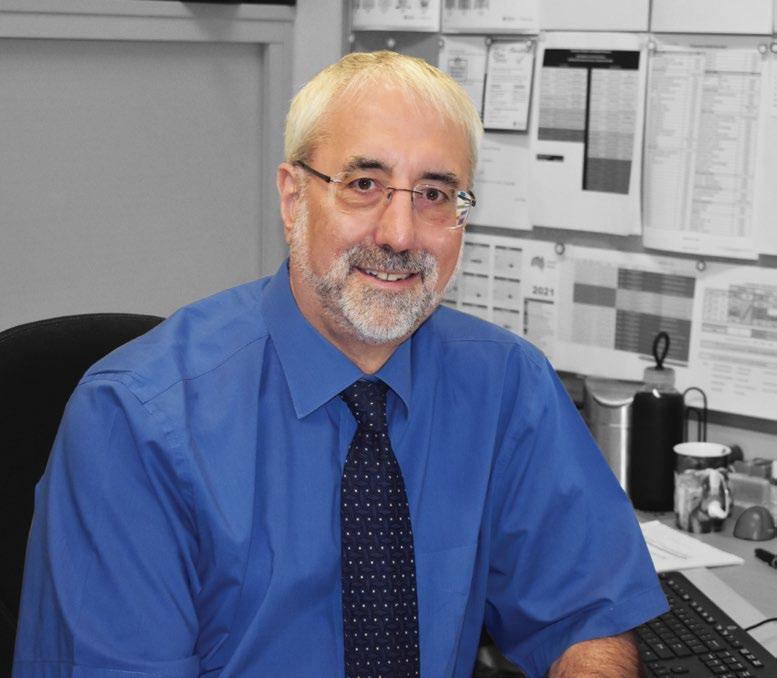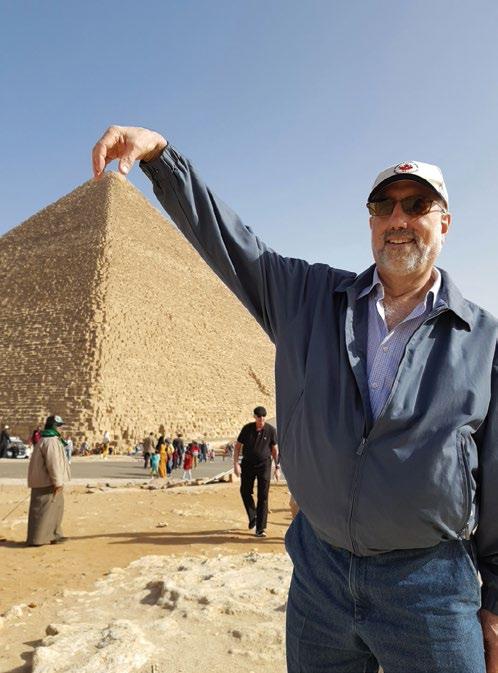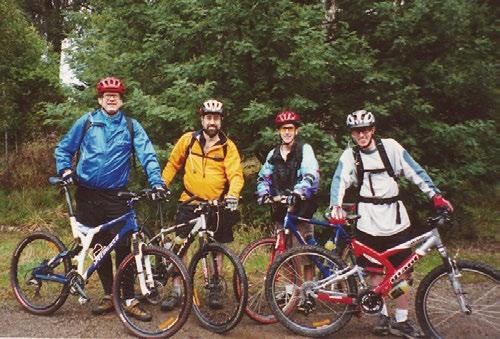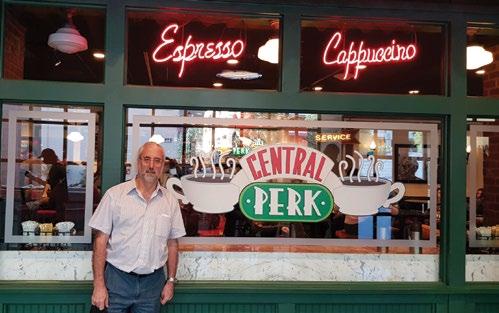
8 minute read
CPD Spotlight
Meet
WINTHROP PROFESSOR
Paul Abbott ao
Winthrop Professor Paul Abbott needs no introduction within dental circles. A well-known and respected endodontist and educator, his contribution to UWA Dental School and to the continuing education of dentists and dental students is enormous. Paul is also a regular presenter of WA Dental CPD courses. We spoke to him about his extraordinary career.
As with all great careers, there is a beginning – and when asked why he decided to pursue dentistry, Paul says as a young boy he was always interested in the human body. “My family all suspected that I would do medicine and I guess I thought that way too but then as I got into high school, I liked the idea of the hands-on practical aspect of dentistry,” Paul recalls. “I also knew a few people doing dentistry and they were pretty happy with what they were doing and the course. I visited a couple of dental practices to see what dentists did and decided on dentistry because it was a mix of medicine and a very hands-on profession.” Paul graduated from The University of Western Australia in 1979 and after four years as a general practitioner, decided to specialise. “I am a strong believer in needing a good foundation of general practice before you specialise in anything,” he says. “Even now, if I was selecting people to do specialist training, if two people were equal in everything apart from general practice experience, I would go for the one who had more general practice experience. “One of the key things in endodontics is what happens to the tooth afterwards, because it has to be restored somehow. The decision-making around that is very subjective, but largely based on experience; not just experience of doing the restoration but seeing that restoration over time.” When asked why he decided to specialise in endodontics, Paul says he went through the process of considering orthodontics, paediatrics, and oral surgery – but kept coming back to endodontics. Additionally, there was only one endodontist in Perth at the time (Tony Sandler), so when Paul was selected to do the program at the University of Adelaide, he grabbed the opportunity. Part of the reason Paul wanted to specialise was so he could teach. “I always had an interest in teaching, even before doing dentistry,” he recalls.
It is clear teaching quickly became a passion. “The interaction with your students is important but seeing the results of your teaching is the really rewarding thing,” Paul says. “It’s more than just teaching students about dentistry or endodontics. The postgraduate students tell me they see it as a bit of life coaching as well. That’s not something I actively go and do but it just happens along the way. They see you under different circumstances and how you cope with things and they see your involvement beyond just treating patients. “I was very fortunate in my post-grad training in that I was treated more as a colleague or as a staff member than as a student, and I try to do that as well with my postgraduate students.” As well as his commitments at the Dental School, Paul has a busy lecturing schedule – both locally and internationally – with an impressive lecturing resume spanning over 45 countries. “If you ask my family, I was a very shy kid and they cannot believe that I lecture to lots of people,” Paul says. “Again, lecturing was an opportunity. When I was in Adelaide finishing my Master’s degree, UWA was looking for someone to teach endodontics. The people here knew I was heading back to WA, so even before I finished in Adelaide I was asked to come in and teach. Being a bit obsessive compulsive, like most dentists, especially endodontists, I really wanted to do it well, but it was a bit of a mad scramble that first year to get a series of lectures together, as well as trying to get a practice going and raising a young family.”
Paul Abbott
If you weren’t in the dentistry field, what would you be doing for a living?
If I’d done medicine, I would have had to do a speciality that involved my hands, maybe a surgeon. The other thing would have been teaching.
What do you in your spare time?
I used to go mountain bike riding, but I haven’t in recent times, largely because of time. It’s usually a whole day of exercise and it’s not something you can do by yourself – you need at least one or preferably several people because if something happens when you’re out on a trail, you need help. I have certainly had a few falls and injuries along the way but survived them all. I don’t have a lot of spare time, but I do enjoy doing handyman type of things and doing small woodworking projects.
What is your favourite book?
I wouldn’t say a favourite book, but one thing I do like to do in my spare time is reading crime fiction. I tend to read authors such as Michael Connelly, James Patterson and Jeffrey Archer.
What is your favourite part of the world?
My favourite part of the world is Perth, but having travelled a lot, there are beautiful places everywhere. Three of my favourite places to visit are New Zealand, Ireland and England. And there is some beautiful scenery in South America. I could list so many other places too.
What is your favourite cuisine?
Indian and Thai – I like spicy food.
Is there anything people might be surprised to learn about you?
I like cooking Indian and Thai food – particularly Indian. I really enjoy using the spices to create different flavours.



Pre-COVID, Paul would travel every month to lecture – overseas four or five times a year, and five or six times interstate, as well as squeezing in time to visit his son in Canada and wife and fellow endodontist Jacky Castro’s family in Columbia. “A lot of my travel can be work related but there are advantages too,” he adds. “I have been to places that I would have never gone to if I had not been asked to go there for a conference. “It’s often locals who are looking after you when you’re in a new place for a lecture or conference, and you might go to their homes and you learn a lot about their society and their culture, as well as seeing the sites. You make some good friends and build up a big network.” Even though the travel for lectures has quietened over the past year, Paul has been keeping busy on various committees, boards and other commitments, including the Dental Board of Australia (his term finishes this year), the Editor-in-Chief of the journal, Dental Traumatology, as well as sitting on the editorial board of the Australian Dental Journal. He is also on the research committee of the International Association of Dental Traumatology, and on another committee to honour the late father of dental traumatology, Jens Andreasen. “Jens was a lovely guy, and I was asked to chair a committee to come up with some ways of remembering him, so we have developed a series of lectures on some key topics that he was particularly involved in.” Paul is also well-known for his research, and says at the moment, his main research projects are through the postgraduate students. “One is a survey on dentist’s knowledge on how to manage dental trauma. Another one is in the process of development is looking at dentists’ diagnosis and management of tooth resorption, which is often associated with trauma but not entirely. The other one is looking at bacterial movement through tooth roots with different materials used for root canal fillings.”
Paul is also working on a project for terminology for diagnosis. “We are trying to get a worldwide or international classification for the different conditions we treat,” he explains. “I developed a classification some years ago, which I still think is quite good, but not everyone agrees,” he smiles. “It is an interesting process linking up with big name people and seeing how they think differently.” With such a varied career, when asked about what he enjoys most, he says it’s seeing the ‘end result’ of teaching, when a student graduates and becomes a specialist. “My involvement with undergrads is less than it used to be but it’s still really nice to see them finish and then to follow their career,” he adds. “To know you have had some influence is rewarding. It is similar to clinical treatment, when you do some treatment and see your patient heal – you always get a buzz out of that.” As well as various allocations for his teaching, Paul was honoured to receive an Officer of the Order of Australia in the General Division (AO) in 2015. “It certainly was an honour and a surprise too,” he says, “When you get the letter you wonder what it is, because it comes with the Governor General’s insignia on it. I have been fortunate to receive various awards, but most of them have been within the profession or some teaching awards from the university. This was something totally out of the profession and at that sort of level, it was a huge honour.”
ADA support
“ADA has been great, especially here in WA,” Paul says. “The support that ADAWA provides professionally is great. “I think we had the advantage many years ago that we were a smaller branch. There were only about 400 or 500 dentists on the register when I graduated – now there are around 2,000, but the local ADA has always had a very high rate of membership and I think this last year the support offered by ADA has been amazing.”
What’s next for Paul Abbott? After 41 years in private practice, he stopped seeing patients last year to make more time for the Dental School. “We are in the process of revising the curriculum for DMD at the moment,” he says. “I am heading up that, so it’s a big job, but it’s interesting and challenging.”










